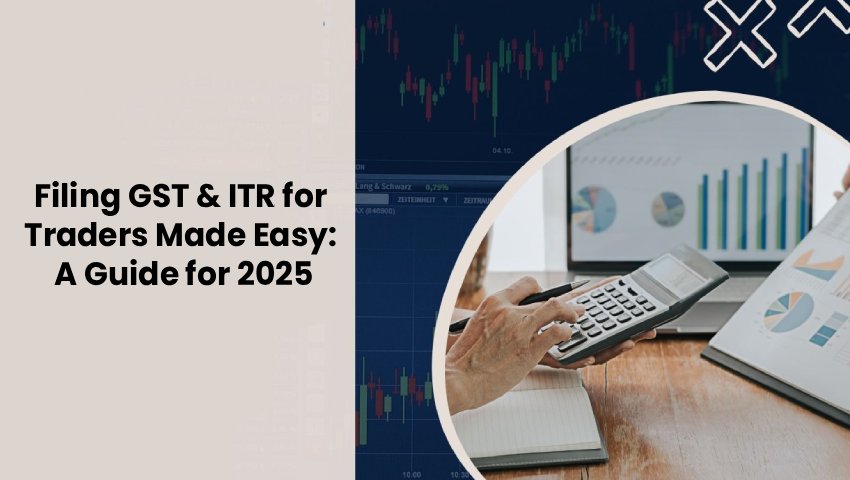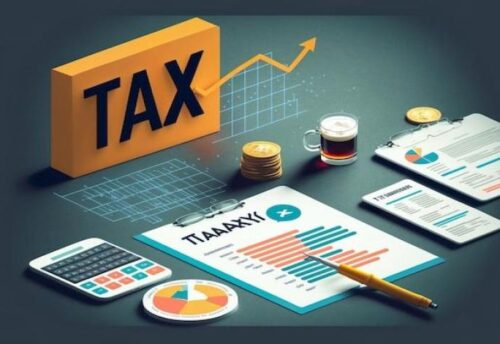
- 09/09/2025
- MyFinanceGyan
- 975 Views
- 4 Likes
- GST, Tax
Filing GST & ITR for Traders Made Easy: A Guide for 2025
For traders in India, tax compliance is not just a legal formality – it is the backbone of a smooth and sustainable business. Whether you run a wholesale business, a retail shop, or trade online, GST filing for traders 2025 and ITR filing for traders 2025 are two unavoidable responsibilities. Many traders find the process complex, with frequent updates, multiple forms, and strict deadlines. At My Finance Gyan, we provide the latest updates and practical insights on taxation, helping traders stay compliant and stress-free. This guide explains GST and ITR filing for traders in 2025 in simple language, with step-by-step instructions, deadlines, challenges, and solutions.
Understanding GST for Traders:
The Goods and Services Tax (GST) is a unified indirect tax applicable to the supply of goods and services. Traders, being intermediaries between manufacturers and consumers, must comply with GST rules if their turnover crosses the prescribed threshold.
- GST registration for traders is mandatory if annual turnover exceeds ₹40 lakh (₹20 lakh for service providers in some states).
- Traders must file GST returns regularly, even if no sales are made in a particular month.
- Input Tax Credit (ITC) plays an important role, as traders can claim the tax already paid on purchases against their GST liability.
Understanding the difference between GST return filing for traders and Income Tax Return (ITR) for traders is essential. GST deals with indirect tax on goods/services, while ITR relates to income tax on business profits.
ITR Filing for Traders:
An Income Tax Return (ITR) is a statement of income, expenses, and taxes paid by traders. Depending on business size, structure, and income, traders must select the right ITR form.
- ITR-3: For traders who maintain detailed books of accounts.
- ITR-4 (Sugam): For traders opting for the presumptive taxation scheme under Section 44AD. This is common among small traders, as it allows declaring a fixed percentage of turnover as profit without maintaining detailed records.
Correct ITR selection ensures smooth processing and avoids notices. Knowing how to file ITR for traders is critical for compliance and financial planning.
Key Deadlines & Updates for 2025:
Traders must stay alert about important tax deadlines. Missing them can lead to penalties and interest.
- GST filing deadlines: Monthly GSTR-3B and quarterly GSTR-1 are the most common. Late filing attracts penalties of ₹50 per day (₹20 for nil return).
- ITR deadlines for traders 2025: For those not requiring an audit, the due date is 31 September 2025. For audit cases, the deadline is 31st October 2025.
- The penalty for late ITR filing in 2025 may go up to ₹5,000 (₹1,000 for income below ₹5 lakh).
My Finance Gyan recommends traders mark these dates in advance and use digital reminders for timely compliance.
Step-by-Step Guide to Filing GST for Traders:
Filing GST may look technical, but it becomes easy if you follow the right process.
Step 1: Collect Documents
- GSTIN, sales invoices, purchase invoices, and HSN codes.
- Bank details and expense records.
Step 2: Log in to the GST Portal
- Visit gst.gov.in with your GSTIN and password.
Step 3: Choose the Correct Return Form
- GSTR-1 for outward supplies.
- GSTR-3B for the monthly summary return.
Step 4: Enter Details
- Upload invoices, declare sales, purchases, and claim ITC.
Step 5: Verify & Submit
- Cross-check entries before submission to avoid common GST filing mistakes traders make, like mismatched invoices.
Step 6: Pay Taxes & File Return
- Make online payment, if applicable, and file the return with DSC or OTP verification.
This GST filing process, step by step, ensures hassle-free compliance.
Step-by-Step Guide to Filing ITR for Traders:
Income Tax Return filing requires accuracy to avoid scrutiny. Here’s how traders can file ITR easily:
Step 1: Gather Documents
- PAN, Aadhaar, bank statements, purchase/sales records, expense vouchers.
- Previous year’s ITR and Form 26AS for TDS details.
Step 2: Choose the Right ITR Form
- ITR-3 for regular traders.
- ITR-4 (Sugam) for presumptive taxation.
Step 3: Log in to the Income Tax Portal
- Visit incometax.gov.in.
Step 4: Enter Details
- Fill in turnover, profit, expenses, tax deductions, and exemptions.
Step 5: Pay Tax if Due
- Calculate liability after adjusting the advance tax and TDS.
Step 6: Submit & Verify
- E-verify through Aadhaar OTP, net banking, or by sending ITR-V.
This structured approach ensures compliance with the ITR filing for traders 2025 requirements.
Common Challenges Traders Face in GST & ITR Filing:
- Mismatch of invoices between the GST portal and books.
- Confusion in selecting the correct ITR form (ITR-3 vs ITR-4).
- Input Tax Credit errors leading to rejection of claims.
- Lack of awareness about deadlines is causing penalties.
- Technical glitches on the GST/IT portal.
Smart Solutions for Hassle-Free Filing:
- Use the best GST & ITR filing software for traders for automation.
- Outsource to professionals for accuracy.
- Keep invoices digitised for easier reconciliation.
- Regularly track updates from the GST Council and Income Tax Department.
- Consult reliable sources like My Finance Gyan for the GST & ITR filing guide 2025.
Benefits of Timely GST & ITR Filing for Traders:
Filing returns on time offers multiple advantages:
- Avoid Penalties: Save money on late fees and interest.
- Smooth Business Operations: Required for loans, tenders, and registrations.
- Claim Benefits: Eligible for Input Tax Credit, tax refunds, and deductions.
- Better Compliance Record: Protects traders from unnecessary notices.
- Financial Transparency: Helps in tracking profitability and planning investments.
Quick Tips for Traders in 2025:
- Start record-keeping early in the year.
- Double-check GST numbers and PAN details.
- Use simple GST and ITR filing tips for small traders, like setting calendar reminders.
- Don’t ignore small expenses; they reduce taxable profit.
- For small traders, consider the presumptive taxation scheme for hassle-free ITR filing.
- Always reconcile books with the GST and ITR portal before filing.
Conclusion:
Tax compliance may look challenging, but with proper guidance and planning, traders can easily handle GST compliance for traders and ITR compliance for traders in 2025. Timely filing avoids penalties, builds financial credibility, and keeps businesses running smoothly. At My Finance Gyan, we are committed to providing traders with the latest updates, deadlines, and filing guides to make GST and ITR compliance simple and stress-free. And if you need any legal or compliance support, you can always choose Startup Portal – your trusted partner for GST, ITR, and business registration services.



